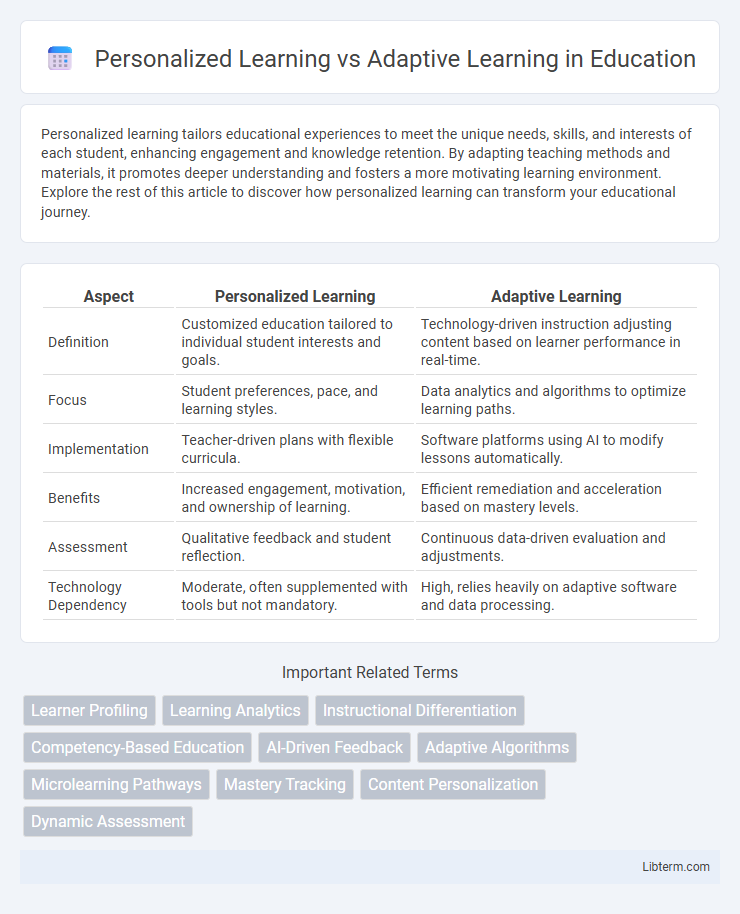Personalized learning tailors educational experiences to meet the unique needs, skills, and interests of each student, enhancing engagement and knowledge retention. By adapting teaching methods and materials, it promotes deeper understanding and fosters a more motivating learning environment. Explore the rest of this article to discover how personalized learning can transform your educational journey.
Table of Comparison
| Aspect | Personalized Learning | Adaptive Learning |
|---|---|---|
| Definition | Customized education tailored to individual student interests and goals. | Technology-driven instruction adjusting content based on learner performance in real-time. |
| Focus | Student preferences, pace, and learning styles. | Data analytics and algorithms to optimize learning paths. |
| Implementation | Teacher-driven plans with flexible curricula. | Software platforms using AI to modify lessons automatically. |
| Benefits | Increased engagement, motivation, and ownership of learning. | Efficient remediation and acceleration based on mastery levels. |
| Assessment | Qualitative feedback and student reflection. | Continuous data-driven evaluation and adjustments. |
| Technology Dependency | Moderate, often supplemented with tools but not mandatory. | High, relies heavily on adaptive software and data processing. |
Introduction to Personalized and Adaptive Learning
Personalized learning tailors educational experiences to individual students' needs, preferences, and interests by adjusting content, pace, and learning style. Adaptive learning uses technology-driven algorithms to continuously assess learner performance and dynamically modify instructional materials in real-time. Both approaches aim to enhance student engagement and outcomes through customized educational pathways.
Defining Personalized Learning
Personalized learning tailors educational experiences to individual students' strengths, preferences, and interests by customizing content, pace, and learning approaches. This method emphasizes student agency and choice, fostering deeper engagement and motivation by addressing unique learning needs. Unlike adaptive learning, which relies primarily on technology-driven adjustments based on performance data, personalized learning incorporates broader factors such as learning styles and personal goals.
What Is Adaptive Learning?
Adaptive learning is an educational technology that uses algorithms and data analytics to customize instructional content based on individual learners' performance, preferences, and pace. This system continuously assesses student interactions in real-time to modify the difficulty, sequence, and type of learning materials, ensuring optimized engagement and mastery of subjects. By providing tailored feedback and resources, adaptive learning enhances personalized education outcomes more dynamically than traditional methods.
Key Differences Between Personalized and Adaptive Learning
Personalized learning tailors educational experiences to individual learners' preferences, interests, and goals by allowing choices in content, pace, and learning paths, while adaptive learning uses algorithms and real-time data to automatically adjust instruction based on student performance and behavior. Personalized learning emphasizes learner autonomy and customization, whereas adaptive learning focuses on dynamic, data-driven adjustments to optimize mastery and address specific knowledge gaps. Key differences include the role of technology, with adaptive learning relying heavily on AI and analytics, and personalized learning incorporating broader learner input and flexibility.
Technology’s Role in Both Approaches
Technology drives personalized learning by leveraging data analytics to tailor content, pace, and learning paths to individual student preferences and goals. In adaptive learning, technology uses real-time assessment algorithms to modify instruction dynamically based on learner performance and mastery levels. Both approaches rely on AI and machine learning platforms to enhance engagement, improve outcomes, and optimize the educational experience through data-driven customization.
Benefits of Personalized Learning
Personalized learning enhances student engagement by tailoring instructional content to individual interests, learning styles, and pace, resulting in improved retention and motivation. It fosters autonomy and self-directed learning, empowering students to set goals and actively participate in their educational journey. Customization of learning paths addresses diverse needs, promoting inclusivity and maximizing academic achievement across varied learner profiles.
Advantages of Adaptive Learning
Adaptive learning leverages real-time data and algorithms to tailor educational content precisely to each student's needs, ensuring efficient mastery of concepts. This method dynamically adjusts difficulty levels and pacing, promoting higher engagement and improved knowledge retention compared to traditional one-size-fits-all approaches. By continuously analyzing performance metrics, adaptive learning systems provide personalized feedback that accelerates learning outcomes and supports individual progress.
Challenges and Limitations
Personalized learning faces challenges such as scalability and the need for extensive data on individual preferences, which can be difficult to collect and analyze effectively. Adaptive learning systems often struggle with limitations in accurately interpreting student performance data and may lack the flexibility to accommodate diverse learning styles. Both approaches require significant technological infrastructure and educator training to ensure effective implementation and continuous improvement.
Use Cases and Real-World Applications
Personalized learning tailors educational content to individual student preferences, goals, and interests, commonly used in K-12 classrooms and higher education to enhance engagement and motivation. Adaptive learning employs AI-driven technologies to adjust the difficulty and pace of lessons in real-time, proving effective in online platforms like Khan Academy and corporate training modules for skill development. Both approaches optimize learning outcomes by addressing diverse learner needs through individualized pathways and data-driven feedback loops.
Choosing the Right Approach for Your Educational Needs
Personalized learning tailors educational experiences to individual student preferences, interests, and goals, offering flexibility in pacing and content selection. Adaptive learning uses technology-driven algorithms to analyze student performance data in real-time, adjusting instruction to target skill gaps and optimize mastery. Selecting the right approach depends on factors such as learner autonomy, curriculum complexity, technological resources, and desired educational outcomes.
Personalized Learning Infographic

 libterm.com
libterm.com